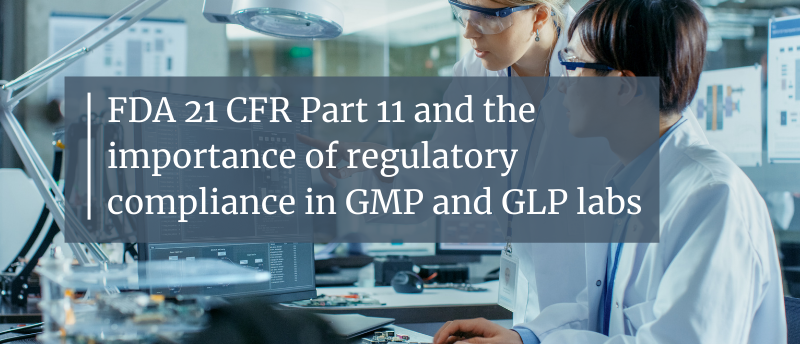FDA 21 CFR Part 11 and the importance of regulatory compliance in GMP and GLP labs

The regulations for food and drugs in the United States, described in Title 21 of the Code of Federal Regulations (CFR), are critical in ensuring safe and ethical drug administration. Whether you are an academic institution, a government agency, or a pharmaceutical company, you have to adhere to these rules at each step of the drug development process. Failure to do so could even cascade into a corporate shutdown in the long run.
Here is a rundown of the essential components of Regulatory Compliance for good manufacturing practices (GMP) and good laboratory practices (GLP) in GxP (good practice) labs and our approach to achieving and maintaining these standards.
The U.S. Food and drug administration’s (FDA; MD, USA) CFR Title 21 and the pharmaceutical drug development process
The FDA’s Code of Federal Regulations Title 21 (21 CFR) consists of three chapters enforceable by the three governing bodies – the FDA, the Drug Enforcement Administration (DEA; VA, USA) and the Office of National Drug Control Policy (ONDCP; DC, USA). The sections concerning drug development and manufacturing generally fall into the first chapter.
Here is a list of notable parts with FDA 21 CFR Part 11, 58, 210, 211, and 820 providing rules and guidelines for the use of microplate readers and software systems in regulated environments.
- Part 11 – Regulations on Electronic Records and Electronic Signatures: A particularly critical section, which makes sure that electronic data is kept safe, reliable, and not manipulated throughout the drug development processes.
- Part 58 – Good Laboratory Practice for Nonclinical Laboratory Studies: Defines the regulatory rules for nonclinical laboratory studies that support or are intended to support applications for research or marketing permits for products regulated by the Food and Drug Administration. Compliance with this part is intended to assure the quality and integrity of safety data to be filed.
- Part 210 – Current GMP, Manufacturing, Processing, Packing, or Holding of Drugs: Contains the minimum current good manufacturing practice for methods to be used in the manufacture, processing, packing, or holding of a drug to assure that such drug meets the requirements of the act as to safety, and has the identity and strength and meets the quality and purity characteristics that it purports or is represented to possess.
- Part 211 – Current Good Manufacturing Practice for Finished Pharmaceuticals: Provides the minimum current good manufacturing practice for preparation of drug products for administration to humans or animals.
- Part 820 – Quality System Regulation: Describes the requirements that govern the methods used in, and the facilities and controls used for, the design, manufacture, packaging, labeling, storage, installation, and servicing of all finished devices intended for human use.
As you can see, CFR Title 21 is an extensive guideline that covers all aspects of drug development and distribution. Molecular Devices (CA, USA) provides tools and services related to parts 11 and 58.
How does FDA react in case of non-compliance
In an interview with the Science Explorer, Timothy Bolus, Compliance Program Manager at Molecular Devices, expresses the importance of regulatory compliance and how a lapse in standards can have serious consequences.
Summarily, he describes what happens in cases of non-compliance observed in an FDA audit/inspection.
FDA auditors/inspectors can arrive unannounced. In the course of an audit/inspection, there is ample opportunity to find observations where certain practices in the course of business do not match written requirements. These can escalate into a formal issuance of Form 483 at the completion of the audit or inspection. This allows the company an opportunity to recognize and mitigate the impact of their non-compliance to their own standard operating procedures and quality standards. If after a certain timeframe these observations go unresolved, the FDA can issue Warning Letters, a formal notification to the company in which the agency cites where the company demonstrated violations to the regulations. This can impact a company’s business operations, revenue, and in some instances, product recalls or corporate shutdowns.
GMP and GLP lab compliance solutions from Molecular Devices
To avoid disruptions caused by non-compliance, you need to anticipate potential issues and tend to them beforehand. Our mission at Molecular Devices is to assist our customers in achieving compliance in GLP (good laboratory practices) and GMP (good manufacturing practice) regulated labs. For that purpose, we have developed proven GxP compliance solutions that accompany our products.
Proven GxP solutions to assure data integrity and compliance.
The collection and integrity of data is perhaps the most complex part and therefore requires the most secure data acquisition and analysis software. That’s where SoftMax® Pro GxP Software can help you achieve full FDA 21 CFR Part 11 compliance. One of the highlights of the software is its system audit trail that tracks all changes including date and time stamps, username, user ID, section statements, signature information, and read results. This enables you to see the users who logged in, what they did, i.e., if they deleted, or altered data entries for manipulation purposes. SoftMax Pro GxP Software also provides you with a controlled and strict authorization process, which means no one outside the approved staff members can access and utilize the system.
Another integral part of laboratory compliance is to ensure that your system generates reliable data without errors. That’s why Molecular Devices offers the following services: Installation qualification (IQ), operational qualification (OQ), preventive maintenance (PM), and repair coverage. Our IQ/OQ/PM services ensure that readers and washers are installed and calibrated properly, and every step of the qualification is documented. This will also make the tracking of potential issues much more practical.
The validation services performed by Molecular Devices does not end after the initial installation. You can design your own Performance Qualification (PQ) or User Acceptance test (UAT) to measure the performance of your microplate reader via SpectraTest Validation Plates, which assess the accuracy and repeatability of absorbance, fluorescence, and luminescence features of your microplate reader.